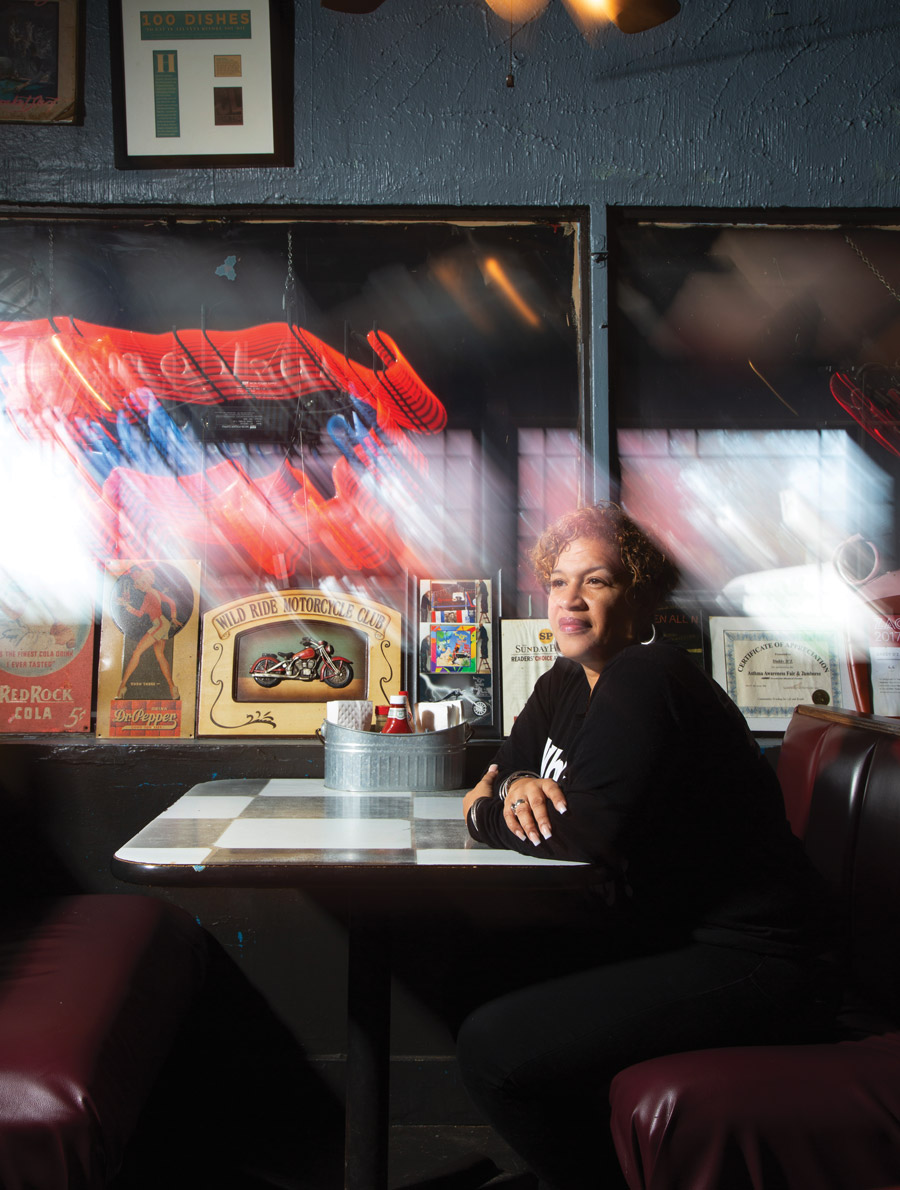
Photograph by Martha Williams
Tourist guides often say Jackson Street Bridge offers the most iconic view of the city, but I think standing on Memorial Drive at Hill Street facing east is the most Atlanta view of Atlanta.
Just over your left shoulder, there’s Nick’s Food to Go, a gritty brick building out of which the Poulos family has served gyros since 1994. Ahead, there’s the squat and colorful Daddy D’z BBQ Joynt, which former owner Ron Newman opened in 1993. And sandwiching Daddy D’z, two near-identical apartment buildings, all beige and steel and glass, have recently risen, offering saltwater swimming pools, quartz countertops, and rents as high as $3,000 for a two-bedroom. Taking in the whole scene, and considering the larger forces of gentrification, it feels like nothing short of a miracle that the two restaurants are still standing.
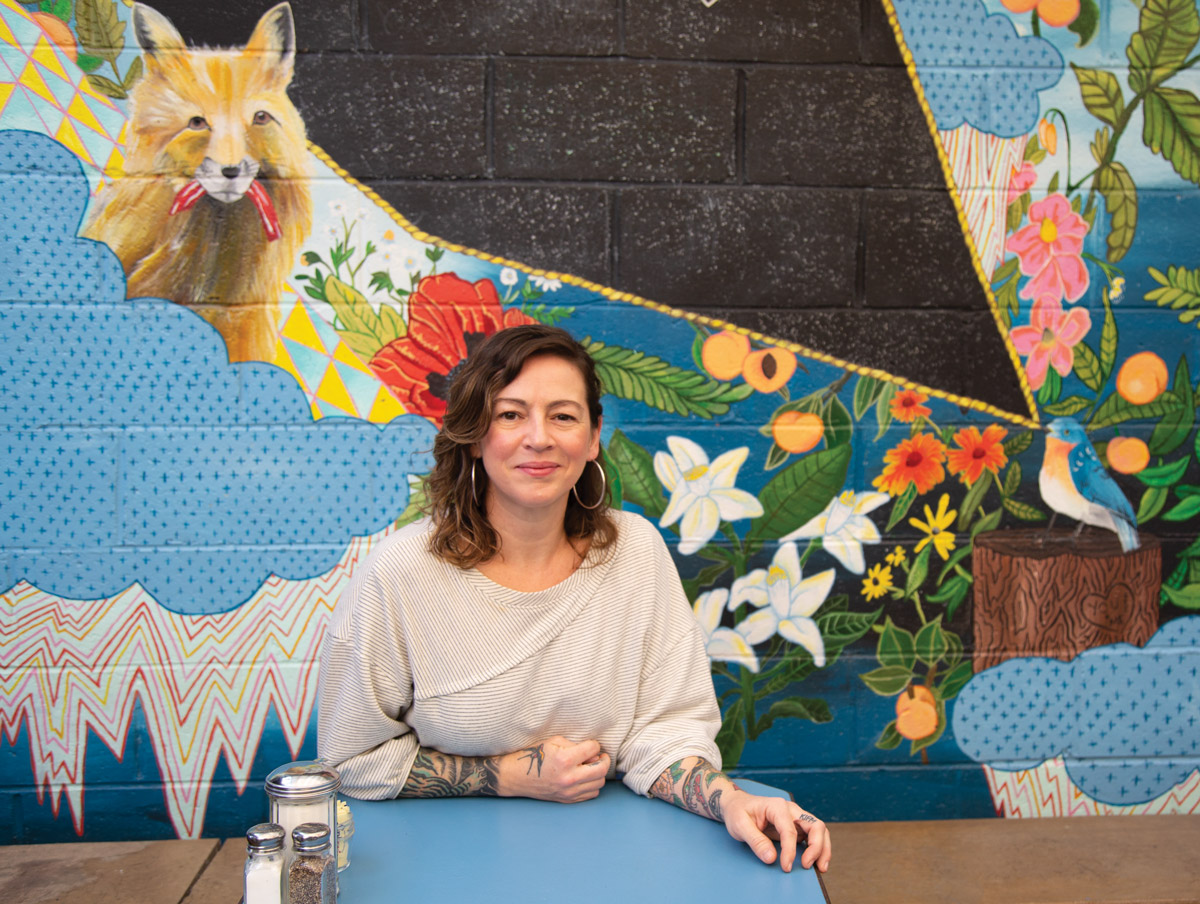
Photograph by Martha Williams
In 2003, when Julie Pender started working at three-year-old Ria’s Bluebird on Memorial Drive, the road was still mostly lined with warehouses, factories, and auto body shops. That blue-collar street cred appealed to chef Ria Pell, who had wanted to open a place where truckers, immigrants, punks, and tourists all would feel equally welcome—“a spot,” Pender says, “where anyone could sit.” Pell died in 2013; diners still line up and wait outside for a table nearly every day.
What would Pell make of Memorial today? “I’m 110% sure she would’ve hated it,” says Pender. “The whole idea of people getting pushed out, and it looking so cookie-cutter, and then putting up signs that say ‘Good Vibes This Way?’ Ria would’ve been super pissed.”

Photograph by Martha Williams
Like Pender, Magdalena Lopez remembers what Memorial was like back in 2003, when her mother, Martha, decided to move her underground cooking business out of their apartment (in Taco Town, then a Latino enclave in north Grant Park) and into a brick-and-mortar restaurant a few blocks away, a short walk down Memorial from Ria’s. “Everything around us was broken down and really old,” says Lopez. Now, she adds, “it doesn’t feel like home anymore.”
Each morning, Lopez and her family, who are Mi Barrio’s only employees, gather in prayer to invite good spirits into the restaurant. They have high days and low days; busy days and days that end with Lopez handing out boxes of surplus food to homeless neighbors. But, she says with a shrug, that comes with the business. According to Lopez, Mi Barrio is still here because it’s a restaurant that treats its customers like family. “It’s like coming to your grandma’s house in Mexico and hanging out,” she says. “We’ve been here for a long time, so we have faith people are going to come here and support us. It’s a small place. It’s an ugly place. But we made it happen.”
Pell and the Lopez family were pioneers, but even back when they opened their restaurants in the early aughts, there were earlier holdouts and haunts on Memorial, places that anchored the neighborhood with affordable food and singular identities (R.I.P., Dottie’s-turned-Lenny’s). For those that have managed to stick around, it hasn’t always been easy.
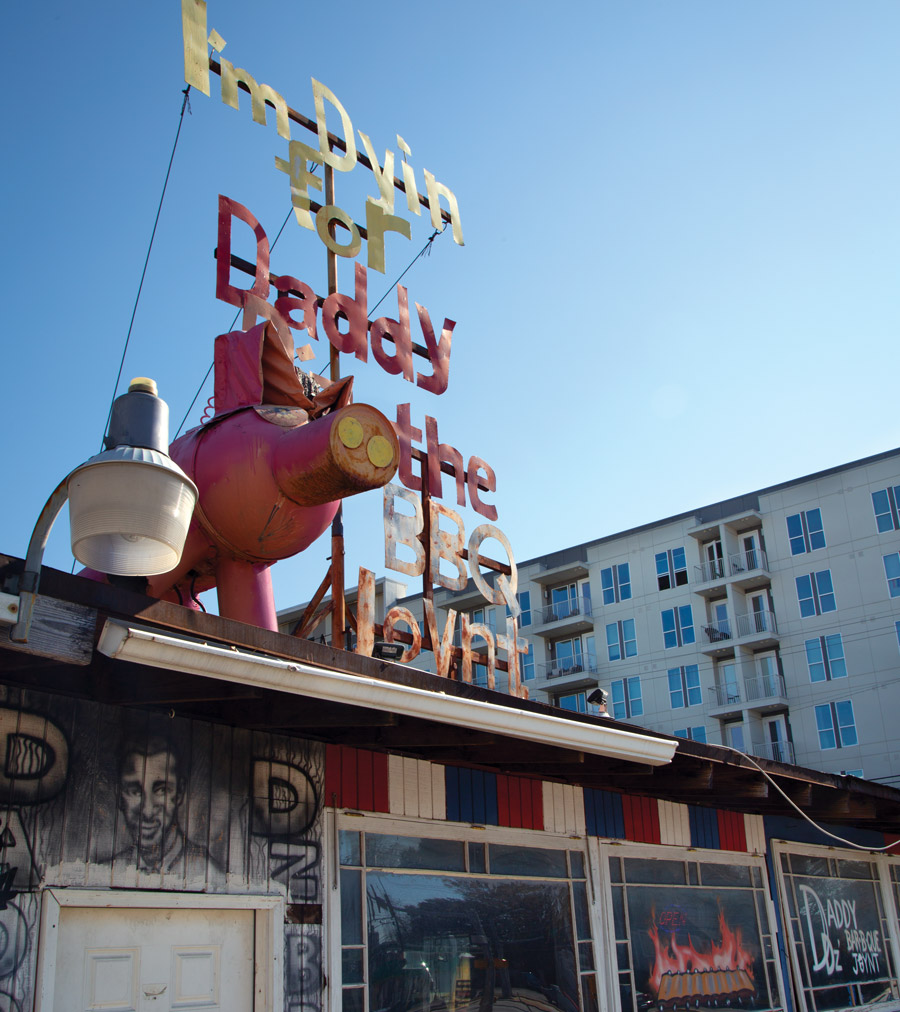
Photograph by Martha Williams
Christianah Coker-Jackson bought Daddy D’z two years ago from the restaurant’s founder, Ron Newman. The barbecue joint already was suffering an estimated 30 percent dip in business after the Braves’ exit from Turner Field a mile away. Losing the Braves, she says, “was a big killer,” but it was hardly Daddy D’z first challenge.
Rising rents displaced a lot of Daddy D’z original regulars, Coker-Jackson says, and mixed-use communities flooded the area with new dining options. “As a business owner, you can see that maybe there’s a possibility of increased business with all this development,” she says. “But as a black woman, I see gentrification as a way to displace African Americans, because these were our neighborhoods, and we’ve been pushed out of them.”
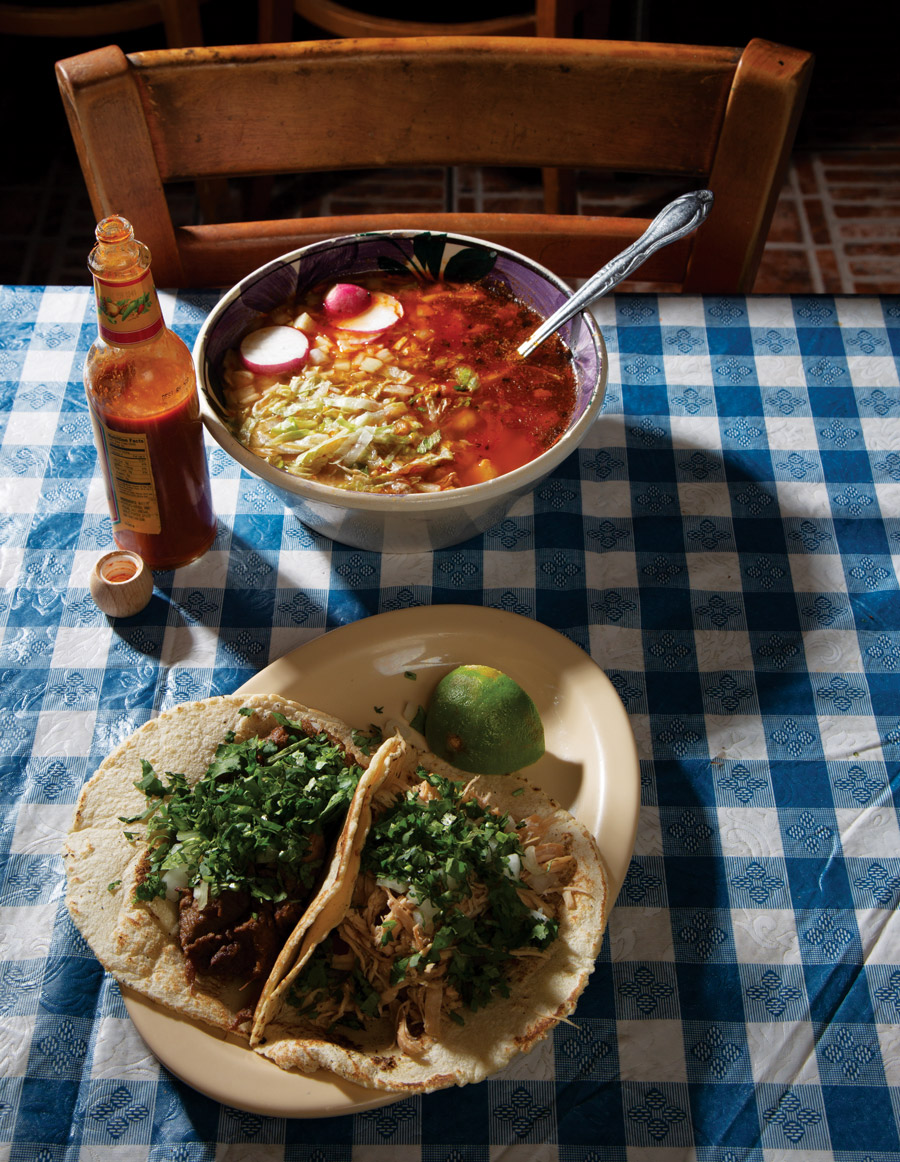
Photograph by Martha Williams
Similarly, many of Mi Barrio’s original Taco Town regulars have left as the neighborhood became less affordable. Some of the neighborhood’s newer residents, Lopez says, “don’t know how we run things around here,” like when the family decides to throw a party in the parking lot with a live band. A few years ago, she says, “people would just walk by and join in”; now, the newer neighbors tend to complain.
“Gentrification brings a different level of competition, and typically, the competition has more money behind it than a small, standalone business,” Coker-Jackson says. “So, they can inundate [would-be diners] with the advertising, the bright lights, the fancy stuff we just don’t have.” It hurts Daddy D’z bottom line, she says, “but I think I can find a way to fit myself in there.” Recently, she’s been updating the restaurant’s chairs, replacing its booths, giving the exterior a new coat of paint. Soon, she’ll start working on a full liquor license.
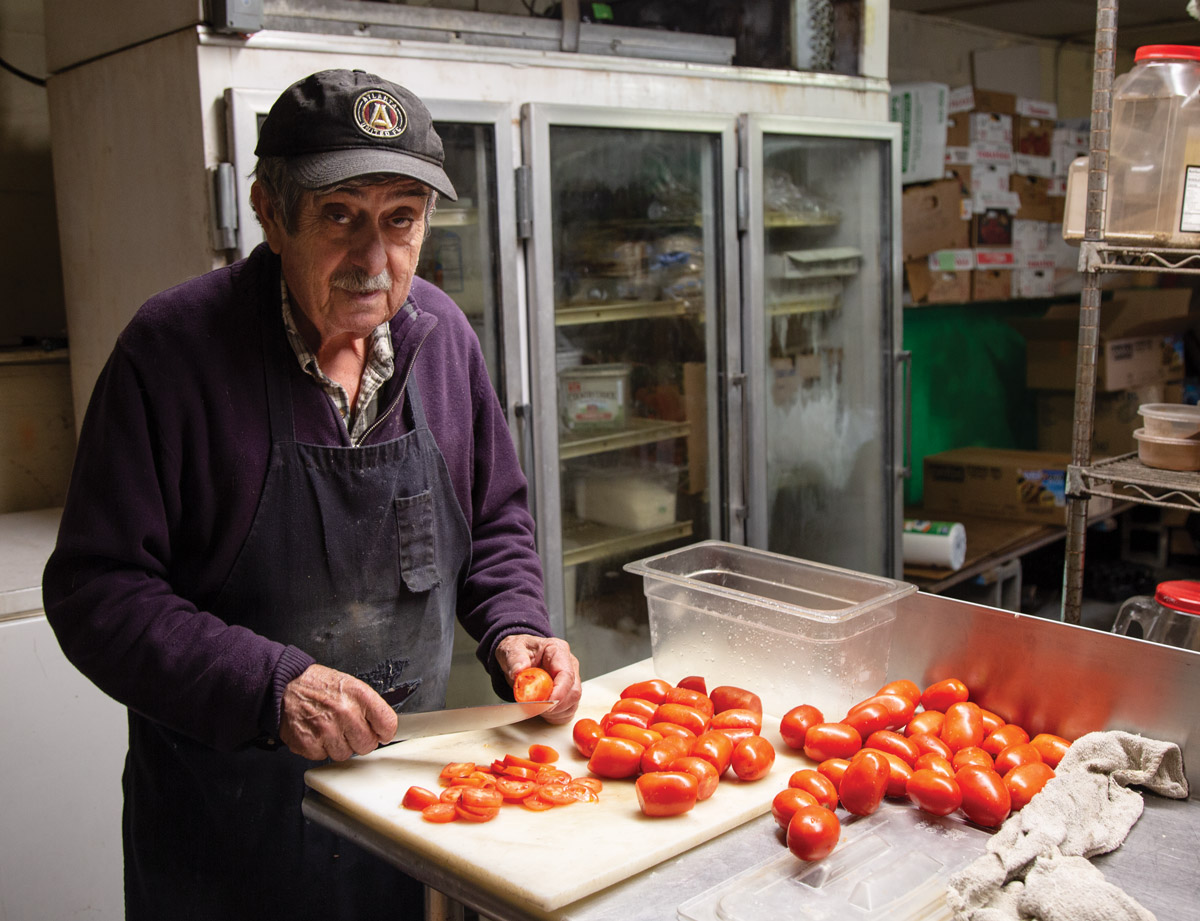
Photograph by Martha Williams
A year after Daddy D’z opened, Nick and Helen Poulos launched Nick’s Food to Go, and it has changed little in the 26 years since. Nick is 76 and technically retired (though he still spends most days at the restaurant). The family added falafel to the menu three years ago to offer more vegetarian options and scrapped the chicken wings and hot dogs. By popular demand, Helen’s famous lasagna is more of a regular menu item than a weekly special. But the restaurant is still strictly a family operation, and that operation seems to be surviving the forces reshaping the area.
“When you’re somewhere that’s changing slowly in front of you, you don’t really realize it,” says Evie Poulos, Nick’s daughter. She recently took her parents down the road to show them the Atlanta Dairies development, and the junction where the BeltLine meets Memorial, for the first time. They couldn’t believe what they saw. “They were like, ‘Wow, people actually want to move downtown?’”
Poulos acknowledges that the rising cost of doing business would make it nearly impossible for a place like theirs—tiny, scrappy, bootstrapped, founded by immigrants—to succeed if it were launched today. But they’ve spent the last quarter-century building their own kind of capital in the neighborhood. “We rely on word of mouth, and that’s how it’s been from the beginning,” she says. “As long as we make good food, people will talk about us. And life goes on.”
This article appears in our February 2020 issue.













